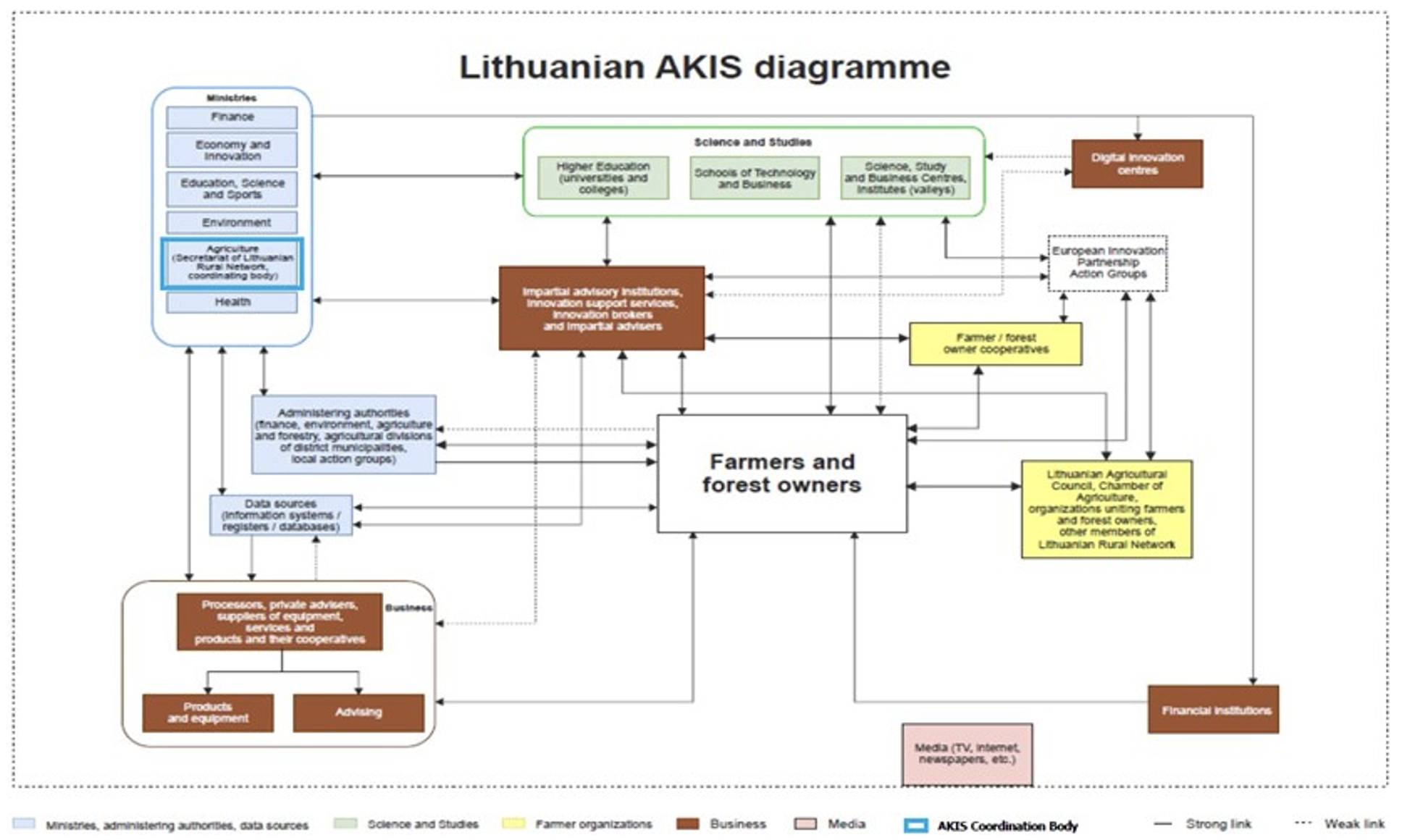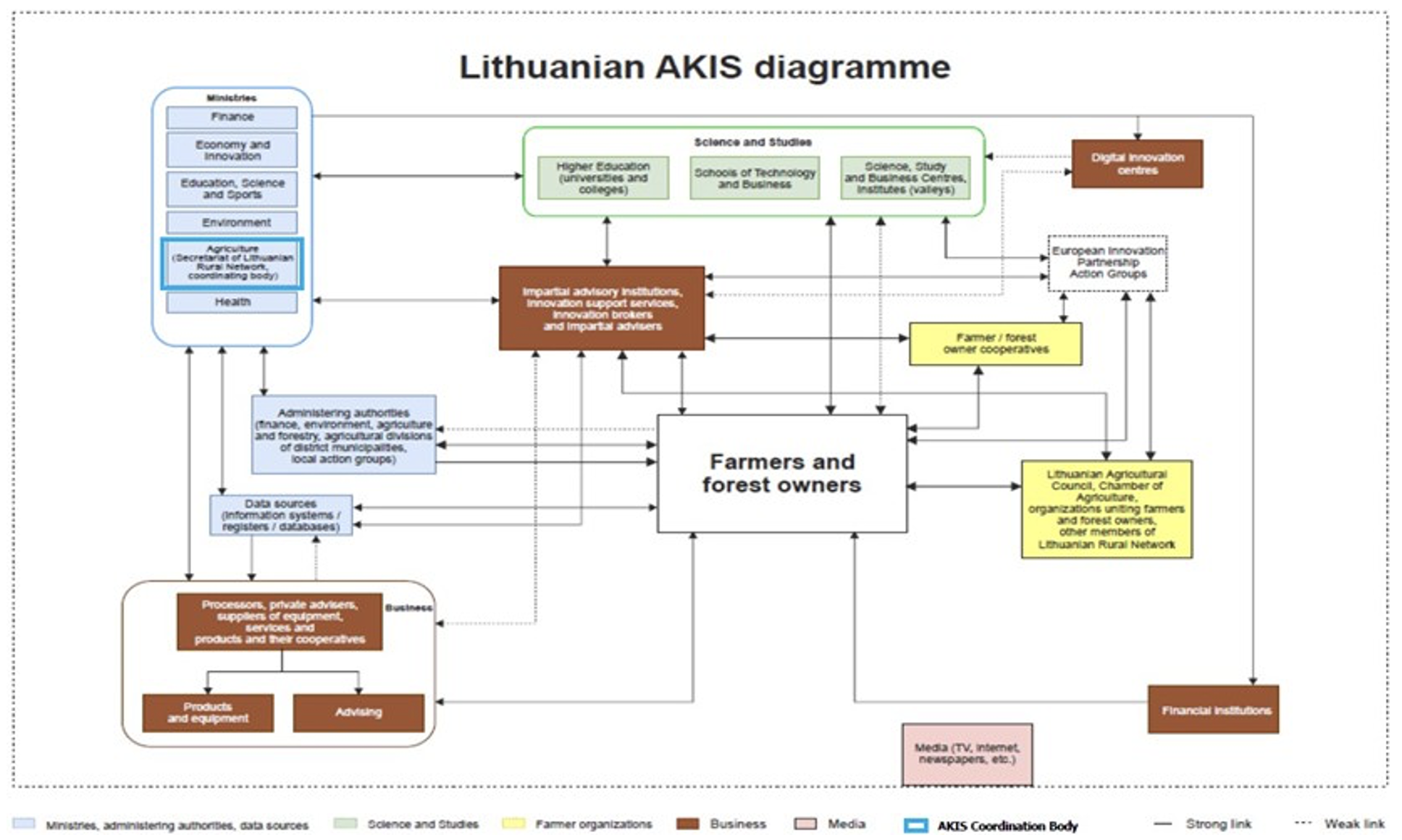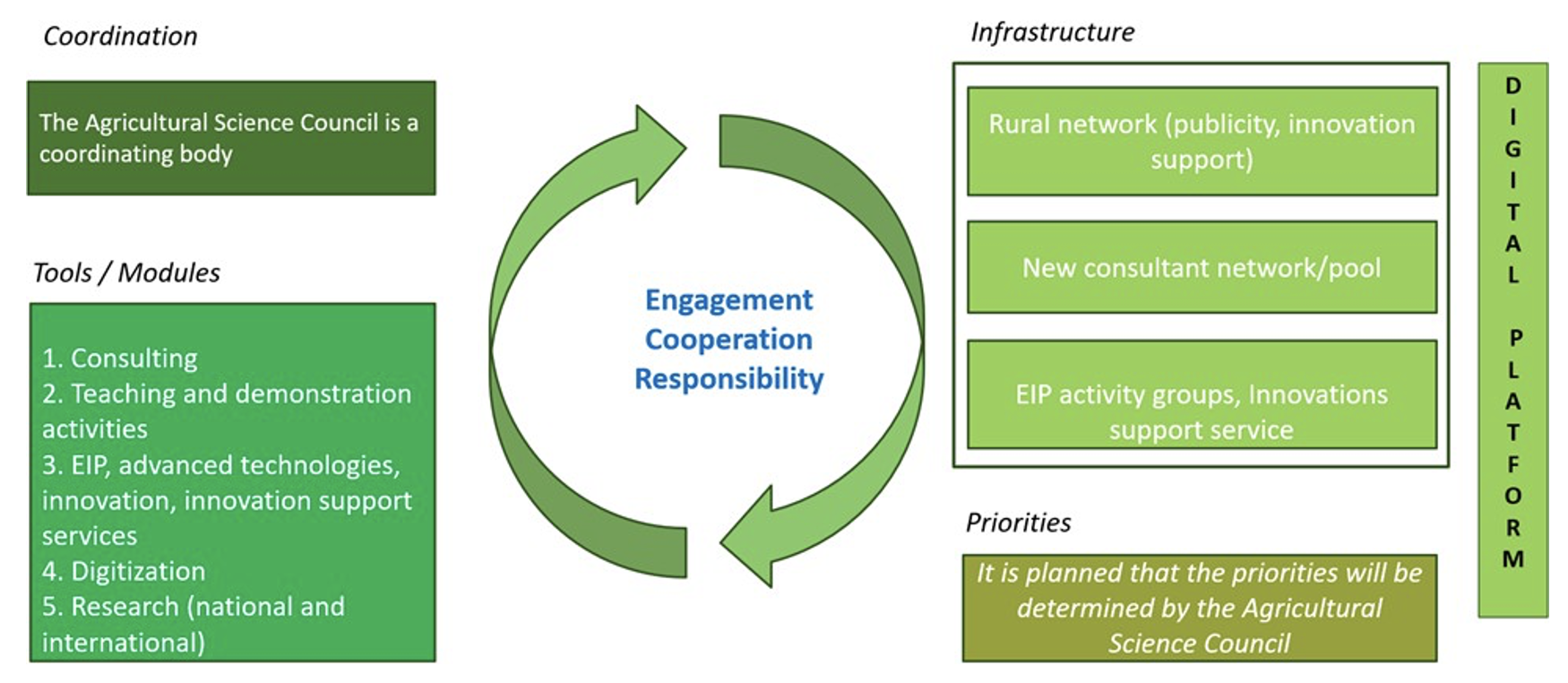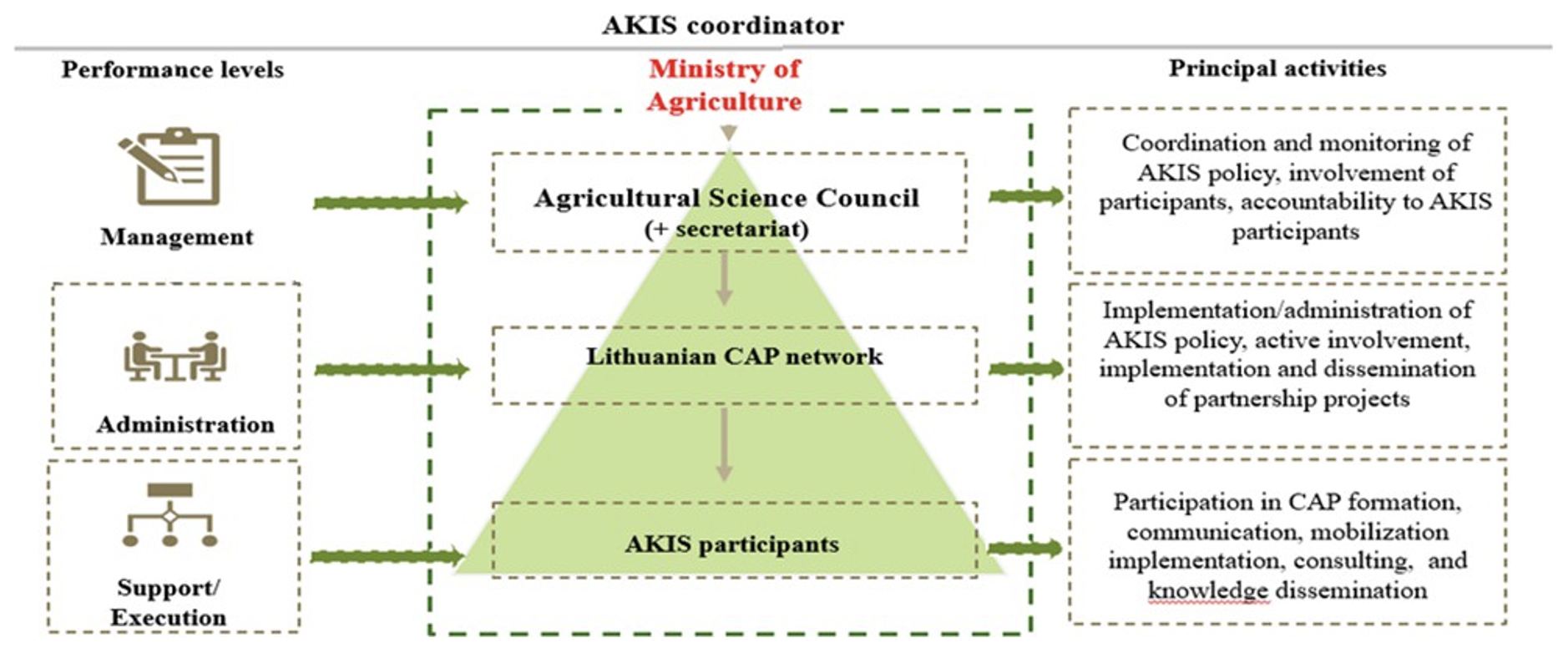2024
AKIS
CAP
AKIS coordination bodies
governance
knowledge transfer

Nearly a decade ago, the Lithuanian Agricultural Advisory Service (LAAS) became one of the pioneers in exploring AKIS in the country. Under the leadership of an innovator promoter in Lithuania’s agricultural sector, the LAAS team was encouraged to delve into AKIS topics. This proactive approach allowed the LAAS team to develop specialized expertise in AKIS, positioning them well for successful participation in the EIP-AGRI instrument and enabling them to launch some of the first Operational Groups (OGs) projects under the Rural Development Programme 2014-2020.
The launch of the OGs in Lithuania also encouraged researchers at Vytautas Magnus University (VMU) to start to take an interest in AKIS issues. The interest of these two institutions, VMU (one of the largest research institutions in the agribusiness sector) and LAAS (the largest national organisation of independent advisors), which are both important for the agribusiness sector, in the topic of AKIS, allowed for the organisation of the first SCAR AKIS meeting in Lithuania on 19-20 November 2019. This 2019 inter-agency working group event in Lithuania is considered exceptional as it captured the involvement of the public sector in the international AKIS theme. It was the good start to encourage other AKIS themed events in Lithuania.
Today compared to the previous programming period, the Lithuanian AKIS has significantly improved. The knowledge sharing and dissemination process in the country now involves public authorities, research and academic institutions, business organisations and farmers' organisations, advisors, Operational Groups and Digital Innovation Centres (DICs).
The AKIS knowledge flows cover a very wide range of topics related to agriculture and rural activities. The main topic areas are: sustainable production; agri-environment; agricultural production technologies; organic and sustainable farming; farm economics and management decisions; cooperation; forestry activities. Recently, there has been a strong focus on environment and climate, innovation on the implementation and digitisation of agriculture.
Figure 1: Lithuanian AKIS diagram

Source: i2connect AKIS Report (2024)
Following a competitive call for proposals issued by the Ministry of Agriculture in 2022 for the vision and implementation of the national AKIS operation and coordination, a group of active AKIS participants - researchers from VMU, Lithuanian University of Health Sciences, LAAS and Lithuanian Research Centre for Agriculture and Forestry - won the tender with the proposal "Study on the development of a functional model of the agricultural knowledge and innovation system in Lithuania". The study highlighted that Lithuanian AKIS is an integrated and complex system, bringing together different areas of activity and bringing together actors at different levels and functions. The mentioned project not only further expanded the knowledge of national AKIS participants about possible AKIS management scenarios, but also created conditions for intensive discussions on these issues with the Ministry of Agriculture.
With reference to the digitalization strategy, the Recovery and Resilience Facility (RRF) and the Lithuanian national budget are funding the development of a national digital AKIS platform. This project aims to modernize AKIS by reducing fragmentation among its participants. This will create a clear, coherent, integrated national digital platform where AKIS participants can easily find all the information and providing features to promote cooperation, exchange of ideas and collaboration. The AKIS platform will integrate the upgraded and modernised Applied Innovation Research and Results Information System (TITRIS) and will have an interface with the Agricultural Training and Advisory Information System (IKMIS). The AKIS platform is planned to be launched in May 2026.
For the period 2023-2027, the Strategic Plan allocates €20 million from the CAP for the following key AKIS interventions:
The bulk of the funds will be dedicated to the development of OGs and demonstration projects. 70 projects are foreseen to be implemented, involving more than 9,000 people. The advisory intervention will provide access to around 21,000 advisory sessions of almost 87,000 hours. Vocational training activities are expected to attract 36,000 people in Lithuania. In addition to the CAP funds, national measures from the national budget also contribute to the operation of the AKIS (EUR 837,000 annually for advisory services provision; EUR 750,000 for R&D; EUR 200,000 for international studies).
The Ministry of Agriculture of the Republic of Lithuania aims to implement the overarching objective of the CAP as set out in the Strategic Plan for Agriculture and Rural Development of Lithuania 2023-2027 - to modernise the sector through knowledge generation and exchange, innovation and digitisation in agriculture and rural areas, and the promotion of their practical application. This is done through the use of AKIS - shared organisational and knowledge flows between individuals, organisations and institutions that use and create knowledge for agriculture and related fields (Art. 3 of the CPR).
The aim of the AKIS CB in the development of the Lithuanian AKIS is to create an efficient knowledge and innovation system that reduces fragmentation among the actors in the system and directly addresses the needs of farmers and foresters.
Figure 2: AKIS participants' interaction scheme

Source: https://zum.lrv.lt/
1. Who is the AKIS CB
In line with the EC recommendations and national commitment, the Strategic Plan establishes a coordination mechanism on a systemic basis. The Lithuanian AKIS CB is a collegiate coordinating body. The Ministry of Agriculture coordinates the whole process and the management functions are carried out by the Lithuanian Agricultural Science Council (further - AKIS Council).
2. Composition of the AKIS CB
AKIS Council is composed of representatives of the main and most important actors involved in the Lithuanian AKIS,
i.e. higher education institutions as well as institutions providing advisory services, research centres, farmers' associations, and governmental institutions (Fig. 3).
Figure 3: Lithuanian AKIS CB

Source: SCAR AKIS (2023)
The coordination of the AKIS operates on three levels:
Management
The Ministry of Agriculture of Lithuania leads AKIS through a dedicated structure - Agricultural Science Council. It brings together universities, advisory institutions, research centers, farmers’ associations, and training farms.
Administration
The Lithuanian CAP Network plays a crucial role in mobilizing AKIS participants and disseminating knowledge and innovation.
Support/Execution
Other AKIS participants contribute within their expertise, providing necessary information on food, agriculture, and forestry. Open-access data sharing supports the efficient functioning of AKIS.
3. Functions attributed to the AKIS CB
The AKIS Council participates in AKIS policy planning, monitors the implementation of AKIS activities, and makes recommendations to the Managing Authority on the implementation of the related Strategic Plan interventions (funding, selection of priority themes, etc.).
4. Procedures for interplaying with other AKIS actors and with the MA of the CAP SP
The AKIS Coordination body will organize meeting on regular basis.
The Lithuanian model of governance and coordination of AKIS is simple and understandable for several reasons: